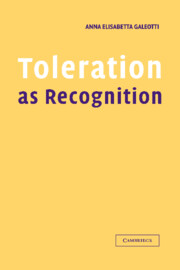Book contents
5 - Should we tolerate racism?
Published online by Cambridge University Press: 22 September 2009
Summary
INTRODUCTION
Arguments for toleration are easier to deal with than claims for limiting toleration of offensive practices. As we have seen above, the argument for public toleration of difference can be grounded on the lack of public respect implied by the principle of public blindness, given that the latter applies unilaterally to minority differences and cannot ensure that newcomers or excluded groups satisfy even the minimal conditions for becoming fully functioning citizens. Moreover, public toleration of differences, given its symbolic nature, can be attributed neutrally (being content-independent) and impartially (being generalizable to all differences, once the harm test is passed). By contrast, the argument for limiting freedom of expression for the sake of toleration is generally more complex. Even if its fundamental premises are sound, it nevertheless implies the limitation of some individual right and also forms of preferential treatment. Briefly, the argument can be summarized as follows.
The starting point must be the common knowledge that liberal democratic institutions and governments have taken a stand against exclusion and discrimination not only in the most obvious formal sense of a lack of rights, but also in the broader sense of a lack of public respect, dignity, and consideration which are due to everyone and seen as necessary conditions for being a good citizen. Without such a starting point, the whole argument against the toleration of offensive practices does not hold up or make sense in a given social context.
- Type
- Chapter
- Information
- Toleration as Recognition , pp. 137 - 168Publisher: Cambridge University PressPrint publication year: 2002



